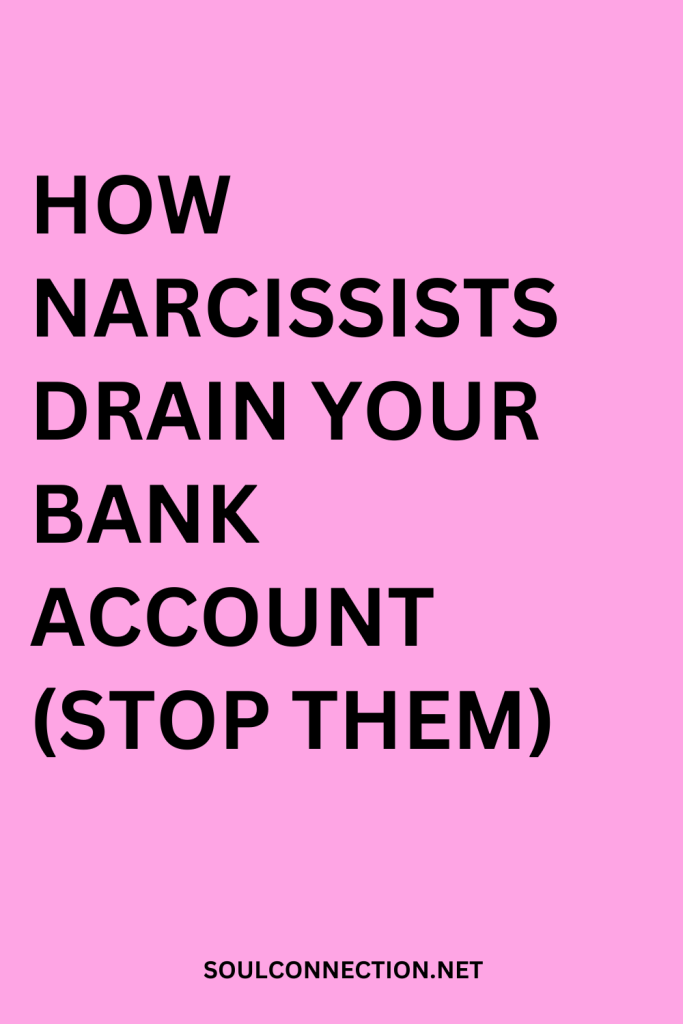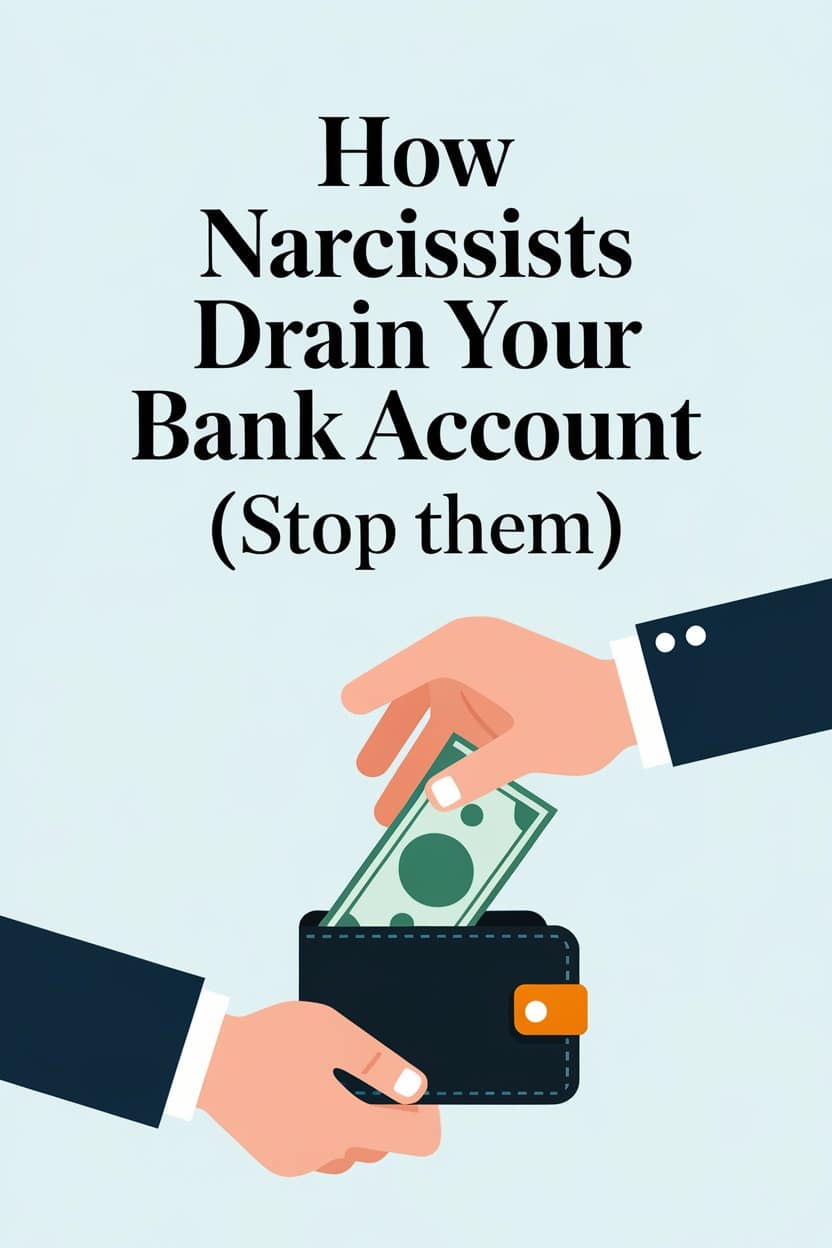Ever wondered why your wallet seems lighter every time your charming, self-obsessed partner walks by? No, it’s not a mysterious financial black hole—unless you count the one sitting on your couch, streaming shows on your Netflix account.
Narcissists have a sixth sense for sniffing out your resources and making them theirs. Let’s call it “emotional asset management,” where your assets mysteriously become theirs.
Here’s how they pull it off—and how to put a stop to the fiscal gymnastics once and for all.
The Gold-Plated Red Flags: Spotting Narcissistic Spending
Narcissists don’t just drain your emotional reserves—they’ve got a special kind of radar for draining your finances too. If your partner regularly treats your credit card limit as a personal challenge, that’s not an accident.
There’s usually a pattern: lavish gifts for themselves, pricey dinners (for them, naturally), and sudden emergencies that always seem to require your bank details.
It’s not generosity—it’s entitlement wrapped in a Gucci belt. Narcissists see your resources as an extension of themselves.
Their wants become your “responsibility.” Why? Because, in their minds, their needs are always more important than yours. If you feel your spending patterns shifting from “treat” to “tribute,” chances are, you’re not imagining it.
Love Bombing with a Side of Venmo
At first, it’s all champagne and roses—you’re swept off your feet by grand gestures and expensive dates. But soon, the tables turn. Suddenly, the grand gestures are expected (and funded by you).
There’s a subtle slide from “let me spoil you” to “you owe me.”
Love bombing isn’t just about emotional manipulation—it’s an investment strategy. Once they’ve reeled you in, out comes the invoice. That expensive weekend getaway? Turns out, your card was on file the whole time.
If your romantic honeymoon phase comes with itemized receipts, it’s not a partnership—it’s a hostile takeover.
Guilt Trips: The Most Expensive Ticket in Town
Narcissists are guilt-trip maestros. If you ever attempt to say “no,” prepare for the emotional pyrotechnics. Accusations of being stingy, unsupportive, or “not invested in the relationship” are standard fare.
The trick here is simple: turn the tables, so you feel bad for not shelling out. Before you know it, you’re justifying every expense—rent, loans, even their dog’s luxury grooming.
If you’re constantly reaching for your wallet while reaching for excuses, it’s not love—it’s financial manipulation.
The Mystery of the Disappearing Joint Account
Suggesting a joint bank account early in a relationship is about as romantic as a prenup on a first date. Yet, narcissists often fast-track financial merging.
Suddenly, you’re sharing an account, but only one of you is actually sharing.
Money flows in, sure, but money (and sometimes heirlooms) flow out—usually in the direction of their hobbies, shoes, or that “business venture” that somehow never profits.
If your shared account looks more like their personal piggy bank, you’re not being paranoid. This is less “joint finances,” more “solo heist.”
Gaslighting Over Your Own Finances
Ever had someone make you feel like you’re bad with money, even though you were fine before you met them? This is classic narcissist playbook stuff.
They’ll nitpick your spending habits, question your judgment, or claim you’re “too controlling” about money.
Before long, you’re second-guessing every purchase, while they rack up receipts with impunity. Financial gaslighting works because it erodes your confidence.
Doubt sets in, and you hand over more control. Suddenly, you’re asking permission to spend your own money. That’s not partnership—that’s an adult allowance, and not the fun kind.
The “Borrower” Who Never Repays
Narcissists are world-class at “borrowing” money for emergencies, investments, or the inevitable surprise expense. Repayment, though, is a concept as foreign as personal accountability.
Every “loan” turns into a gift, every IOU is suddenly “forgotten,” and if you mention it, you’re accused of “keeping score.” This is less borrowed money, more unofficial taxation.
If your partner’s borrowing habits make payday lenders look honest, it’s time to revisit your boundaries.
Destroying Boundaries One Splurge at a Time
Healthy couples set limits and respect each other’s financial boundaries. Narcissists, on the other hand, see boundaries as speedbumps—annoying but easily flattened by their needs.
Maybe you said no to a big purchase, only to find it gleaming in your living room the next day. Or you agreed to a budget, only for them to “forget” it the minute something shiny pops up on their feed.
These aren’t just innocent mistakes—they’re deliberate tests of your resolve.
If your limits are treated more like suggestions, you’re not living with a partner—you’re living with an overgrown child who thinks your financial boundaries are imaginary friends.
How to Stop the Drain Tonight
Nobody likes feeling like an unpaid ATM. The good news: you can reclaim control. Here’s how to start, without needing a finance degree or a second job.
Start with transparency. Narcissists thrive in the fog. Shine a light on your finances by tracking spending, separating accounts, and setting clear rules.
If conversations about money always end with you feeling guilty or confused, put it in writing. No more “I thought we agreed…” ambiguities.
Hold your ground. Boundaries aren’t just for toddlers and traffic cones. Define your limits. If your answer is no, stick to it. Expect pushback, but don’t let emotional blackmail sway you—remind yourself (and your partner) that your needs matter too.
A respectful partner will listen. A narcissist? Well, brace yourself for some fireworks.
Say no to joint accounts—at least for now. Keeping finances separate isn’t a lack of trust; it’s common sense when trust is shaky. If they insist, ask why.
If the answer involves “trust” but only applies to you, that’s called a double standard, not a relationship.
Document everything. If your bank account’s a revolving door, keep receipts. Literally. Digital or paper, it doesn’t matter—just have a record. This isn’t being paranoid; it’s protecting yourself from amnesia (theirs, not yours).
Seek support. Financial manipulation thrives in silence. Reach out to trusted friends, family, or even a professional—someone who’ll remind you you’re not crazy, and that your money is, in fact, yours.
Consider professional help. Therapy (for you, not them) can help untangle the emotional knots that keep you stuck.
If money arguments keep repeating, a financial advisor or couples’ counselor might help—if your partner’s willing. If not, that’s telling in itself.
When Enough Is Enough
No amount of budgeting apps or spreadsheets will save you from someone determined to empty your pockets for their own gain.
At some point, the healthiest thing you can do is walk away—preferably with your dignity (and savings account) intact.
If leaving feels overwhelming, start small. Hide an emergency fund. Move direct deposits to a safe account. Tell someone you trust.
Each action, however tiny, is a step back toward financial independence.
Remember, narcissists hate losing control—but you’re not powerless. Your bank account (and your sanity) are worth defending.
Reclaiming Your Wallet and Your Worth
Surviving a narcissist’s financial antics isn’t about learning all the tricks in the book; it’s about watering your own confidence until it drowns out their demands.
Your money is more than just numbers—it’s a reflection of your boundaries, self-respect, and future.
Set clear limits, enforce them, and refuse to apologize for protecting what you’ve earned.
If your partner can’t respect that, hand them a bill for the emotional rent they owe—and start investing in someone who values more than just your balance.
Your wallet (and your self-esteem) will thank you.


